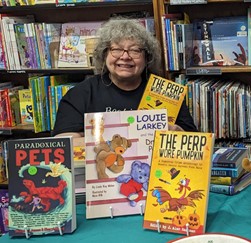 by Linda Kay Hardie
by Linda Kay Hardie
We’ve all heard this quote and its variations: “I have made this [letter] longer than usual because I have not had time to make it shorter.” It’s from Blaise Pascal, seventeenth-century French mathematician and philosopher. It’s also been said by Mark Twain, Abraham Lincoln, Winston Churchill, and others, but Pascal was first.
You may have found this when writing social media posts. If you’re in a hurry, isn’t your post longer than if you have time to think through what you’re trying to get across? Or perhaps you send off a quick post, only to find everyone misunderstood what you meant? To write something clear and short, you need to take the time to think through what you want to communicate.
It works for stories too.
Many writers start out with short stories, especially flash fiction, thinking they’re easy because they’re shorter. Shorter only makes them harder. There’s no room for error. No time to wander around to smell the roses.
Flash stories are a form of poetry. Every single word must count. Every single word must move the story along. You have to tell a story in under 2,000 words or, often, between 1,000 and 1,500. It’s only in a novel that you have the luxury of wandering, word-wise.
I sold a microfiction story to an online magazine. Their word count limit for the monthly publication is 200 words. My story was 108 words long. The editor called it “visceral and beautiful.” Wow. Even I’m impressed.
How do you write well in a short form?
Watch your language. By that I mean, no passive voice. With apologies to Snoopy, “It was a dark and stormy night” doesn’t cut it as the start of a story now. Not even then, but that’s another story! Try this instead: “Heavy rain pounded against the bedroom window.”
Why is that better? Because the second example paints a picture in the reader’s mind. The first one doesn’t. I know you’ve heard this before, but it’s important: Show, don’t tell. I’ll give you another example of the difference.
“It was a dark and stormy night. Laura was scared. She was in her bedroom and pulled the covers over her head to hide from the terrifying storm.” That’s telling.
Now compare it to this: “Heavy rain pounded the bedroom window. With the blanket over her head, Laura shivered.” The second one is exactly half the length of the first one, fourteen words to twenty-eight, and it shows us what’s going on, lets us feel it.
You can write the first way for your first draft, then once you get it down, you fix it up, as writer Anne Lamott says. The best way to write short is to write long first. Get it all out of your system. Edit it down. Tighten it up. Polish each word.
These days I mostly write short stories, but I have written longer works. For my master’s degree in English, with an emphasis on writing, I had to write a thesis. I made it a 311-page novel. I’ve also written two middle-grade novels, and I’m working on a third. They’re all unpublished right now, but I send them out to agents.
My publication track record is much better in the short form. In the past five years, I’ve had twenty short stories published (along with ten other short pieces, including poems, essays, and other short nonfiction), so I know what I’m talking about. One of my stories, “Grenade Blows Up,” recently won the Certificate of Excellence award from the Cat Writers’ Association’s annual communications contest. It’s available in the anthology Tales of the Apocalypse, from Three Ravens Press.
One final thought. These days, most of us find ourselves busy. We work, sometimes more than one job, take care of families—cat and dog babies count—keep up with the news (aargh), and simply try to get through it all. Who has time to read novels? Sure, we can make time occasionally, but there’s always time for a short story. Read one or two.
Linda Kay Hardie writes horror, crime, and SF/fantasy stories, as well as poetry, essays (often about cats but sometimes about baseball), and fiction for children. She also writes recipes, and won a trophy in 2002 for best rib rub in the amateur division of the Best in the West Rib Cook-off in Sparks, Nevada. Linda’s writing has won awards dating back to a fifth-grade essay on fire safety, and in 2024 for her short story “Grenade Blows Up.” In 2022, she was honored with the Sierra Arts Foundation’s Literary Arts Award for fiction. Linda makes a living as a freelance writer and as staff working for Abyssinian cats.
